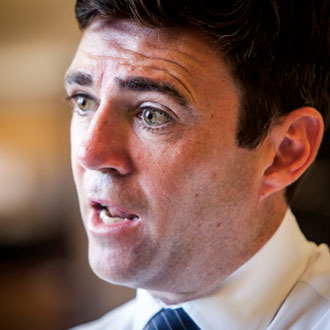GPs to be employees of new integrated care organisations, under Labour plans to integrate care

GPs will be employed by new integrated care organisations set up in every area of the country, under the Labour party’s 10-year NHS plan for Government.
Setting out the details of the plan today, shadow health secretary Andy Burnham said there were currently ‘too many’ NHS organisations, but that Labour would provide the incentive for ‘all providers’ to ‘evolve’ into integrated care organisations (ICOs).
Under the plans, ‘young GPs’ would be encouraged to work for the ICOs as an alternative route to a GP partnership.
The ICOs will be set up in ‘every health economy’ and will be paid a single ‘Year of Care’ tariff to provide primary, secondary and social care to people deemed most at risk of hospitalisation.
Mr Burnham said he had originally envisaged hospitals taking the lead on forming ICOs – as he revealed in an interview with Pulse last year – but that he had accepted that there was not ‘one model of care’ and that they could be led by GP practices.
He added that the ICO will ‘hold the ring’ and provide a single point of contact for patients.
He added: ‘It no longer makes sense to focus solely on the viability of individual institutions, particularly where efforts to secure the finances of one could end up destabilising all around it.
More on Labour’s 10-year plan
GPs to conduct loneliness and heating checks on elderly, pledges Miliband
Labour needs to rethink its approach to general practice
What has been the reaction to Labour’s 10-year NHS plan?
‘The public spending outlook for the next 10 years brings a new reality. To compete in silos is a luxury we can no longer afford. The stark truth is that there are too many separate organisations with separate administrations.
‘There are savings to be made from reducing administrations in every health economy in England. We need to break down the silos and end those divides that hold us back: primary versus secondary care, physical versus mental health, NHS versus councils… [P]eople must leave loyalties to parts of the system behind and embrace a new shared loyalty to the local population.’
Speaking also at a roundtable attended by Pulse yesterday, Mr Burnham said the integrated care organisations caring for the most vulnerable people would employ ‘younger GPs at the start of their career’ and would ‘take a little bit of pressure off’ the rest of the GP workforce.
He said: ‘The most vulnerable patients could be cared for differently in a different model of care… that takes a little bit of the pressure off.
‘It’s also about saying that if younger GPs in the early part of their career want to work for an integrated care organisation then that is something that I think we would encourage. I met a group in Manchester recently who said: “We don’t want to become partners in a practice straight away, we want to work differently. We’d like a more salaried position to begin with and maybe go into partnership later on in our career”.’
And, speaking today, Mr Burnham indicated that these integrated care organisations is where Labour’s 8,000 new GPs would work, as he said the party would ‘create a ladder’ into NHS work via its ‘Time to Care’ £2.5bn NHS fund for young people wanting to work in the new system of integrated care.
Commenting on the plans, Professor Sir John Oldham, the GP leading Labour’s healthcare commission which reported last year, said in his view the plan did not need to signal the end of GP partnerships, but said that GP ‘corner shops’ would no longer be viable.
He said: ‘In terms of general practice and partnerships and where that goes, none of this interferes with what I see as the natural progression and debate that would go on anyway in general practice and primary care about what is the nature of our orgnisations to meet the future demands. My personal view is I think that the sort of things that [RCGP chair Dr] Maureen Baker has been talking about: federated structures, larger conglomerations of people sharing back-office functions, employing specialists themselves – rheumatologists, dermatologists, my own practice before we had a dermatologist there for 15 years, we did ultrasounds, we did ecocardiograms.
‘So I think there are huge exciting opportunities for general practice and primary care to occupy a space, should they wish to do so. What won’t work is not cooperating with people. What won’t work is deciding on having a corner shop mentality. That won’t work but working on a bigger scale will work. I think the future is a very exciting one for general practice. My career is in the past for that but I, in a sense, would love to start again.’









